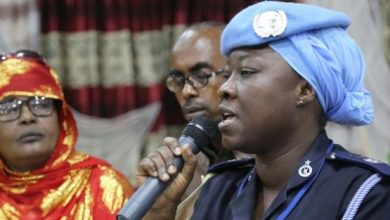Displaced East African business owners find new home at SeaTac International Mall
SEATAC— Inside the newly opened SeaTac International Mall, sheer curtains and colorful clothes hang on walls that line the corridors.
SEATAC— Inside the newly opened SeaTac International Mall, sheer curtains and colorful clothes hang on walls that line the corridors.
The 21 stalls rented out by small business owners, who are primarily East African immigrants or refugees, feature wares such as home décor, traditional African clothing, and shelves of bejeweled tea sets. On Monday a few shop owners quietly stirred in their stalls as they returned to work after celebrating Eid al-Fitr, the festival that concludes Ramadan.
Located at the busy intersection of International Boulevard and South 208th Street, the SeaTac International Mall serves as a one-stop shop: It also has an attached grocery store, a chiropractor’s office, as well as office spaces for rent. The co-owners plan to open a coffee shop and deli in the near future.
This complex, which once housed a bike shop and auto parts store, is now home to many of the Somali-owned businesses that were displaced from the nearby Bakaro Mall a couple of years ago. As small business owners who had nowhere to go after their shops closed in 2019 reopen at the SeaTac International Mall, the site offers a nontraditional ending to a typical story of gentrification and displacement.
“It’s great to be here. The community needed something like this,” Ishaq Ali of the shop Ishaq Ali Fashion said in Somali through translation from Faisal Mohamed, a co-owner of SeaTac International Mall.

Faisal Mohamed, co-owner of the SeaTac International Mall, gives a tour of the mall’s grocery. 217135 (Erika Schultz / The Seattle Times)
The mall’s May 4 opening came at a time when small businesses have been disproportionately impacted by the COVID-19 pandemic. Due to challenges including lack of access to capital and savings as well as language barriers, small businesses owned by people of color, immigrants and refugees have not rebounded from the pandemic as quickly as other companies, Seattle Southside Chamber of Commerce President and CEO Andrea Reay said.
According to the National Bureau of Economic Research, from February to April 2020, African Americans saw the largest decrease in active business owners with a 41% drop, followed by immigrant business owners with a 36% decrease. Latino business owners decreased by 32%, while female business owners saw a 25% drop. The number of white business owners decreased by 17%.
Following fierce opposition and a lawsuit from the previous property owners, Bakaro Mall, which featured dozens of Somali-owned shops, closed in 2019 to make way for a 585-unit mixed-use residential project to be developed by Spokane-based Inland Group.
Bakaro Mall’s closure hit close to home for Mohamed, whose parents had lived 10 minutes from the shopping complex and knew people with stalls there. The displacement of businesses left a gap in the community that Mohamed hoped to fill by leasing a new property with his brother-in-law Mahamud Duale and family friend Abdirashid Hersi.
With a business management degree from North Dakota State University, Mohamed worked in corporate procurement and supply chain for most of his career, while Duale owned a grocery store and was familiar with operations. Meanwhile, Hersi was well-versed in community engagement owing to his outreach at local nonprofits and long-term residence in Seattle. The three combined their skills and in late 2019 found a space for lease, brainstormed the concept, reached out to prospective tenants, and drew up contracts.

Abdirashid Hersi, from left, Faisal Mohamed and Mahamud Duale are co-owners of the SeaTac International Mall, earlier this month. (Erika Schultz / The Seattle Times)
They received help from the city, nonprofits, and private businesses along the way. For instance, the SeaTac-based Seattle Southside Chamber of Commerce referred the co-owners to financing opportunities and wrote a letter of support for the King County’s Communities of Opportunity Commercial Affordability Pilot, which provided them with $150,000 for the project last year. The chamber also helped with marketing and promotion, as well as hosting the ribbon-cutting ceremony in early May. Craft3, a nonprofit loan fund that operates in Oregon and Washington, provided a business loan to help cover the cost of construction
Reay from the chamber said that they helped the Bakaro Mall business owners relocate as soon as they learned of the possibility of displacement. While the chamber had helped small business owners during similar projects in South King County in the past, SeaTac International Mall was the largest relocation project they collaborated on.
From the beginning, The City of SeaTac Economic Development team helped the three partners and their architect on the permitting and building process, and connected them with various organizations to help with business development, regional marketing and funding, SeaTac’s Economic Development Manager Aleksandr Yeremeyev said.
In Reay’s eyes, SeaTac International Mall serves as a community-led solution to displacement. “Commercial affordability is a huge issue throughout the Puget Sound region. So many small businesses and microbusinesses face displacement, and that has a tremendous impact on the community,” Reay said. “It’s a great example of what can happen when private and public collaboration and partnership takes place.”
The mall not only serves as a place of commerce, Reay said. It’s also a community gathering space.

Displays of perfume at a stall at the SeaTac International Mall. (Erika Schultz / The Seattle Times)
On a recent Monday, Ali of Ishaq Ali Fashion sat behind a counter filled with golden costume jewelry. While the new stall is owned by her son, Ali’s daughter had a shop called Naji Fashion in Bakaro Mall. The previous mall’s closure sent a shock wave through the local East African diaspora, Ali said. SeaTac International Mall isn’t as busy as Bakaro Mall yet because it’s still largely unknown, Ali added, but opening up the new shop felt like having a piece of the community back.
Mohamed and his partners are hoping to create a space for new entrepreneurs, too, and aim to keep rent affordable at $650-$700 a month.
Kent resident Najmo Hamud, co-owner of Fashion King, did not own a shop at Bakaro Mall, but she learned about the new opportunity through one of the mall’s founders. In a nod to growing up with seven boys, Hamud’s store sells boys’ and men’s western clothes as well as traditional Somali clothes such as colorful sarongs in various patterns called macawis. Although it was a quiet Monday afternoon, Hamud said that her store was filled with patrons until around 2:30 a.m. in the days leading up to Eid al-Fitr.

Najmo Hamud talks in front of her store, Fashion King, a clothing store for boys and men, at the SeaTac International Mall earlier this month. (Erika Schultz / The Seattle Times)
“I love seeing brothers dressing up,” Hamud said as she folded a shirt. A personal trainer and respiratory therapist, Hamud describes herself as a workaholic who designs some of the shop’s clothes, and also recently opened a fitness center for women in Renton.
While many of the stalls feature similar items, each shop has its own flair and following, Mohamed said. The week before, women waited outside the mall’s door beginning at 7:30 a.m. to get henna from a beauty salon. Another stall featured hair braiding and makeup services by Najma Beynah, the owner of Bainah Beauty. Beynah had always wanted to start a salon, and braided people’s hair in her home. Although the Kent resident didn’t know most of the other shopkeepers, she said she felt welcomed by the community.
“Everybody treats me like a daughter,” Beynah said, her long braids partially covered in a floral head wrap.
A corridor that connects the stalls to the grocery store features two prayer rooms for people to observe throughout the day. The culturally relevant grocery store owned by Mohamed and his partners sells food such as dried dates and grains imported from Arab countries. The nonprofit East African Community Services, which offers after-school programming, will move into a spare office next month.
In the future the co-founders would like to own properties and start their own chamber of commerce for the East African community. “If our tenants succeed, we succeed. We don’t want to just be landlords to them. We want to provide them with tools to help make them successful,” Mohamed said.

Faisal Mohamed, co-owner of the SeaTac International Mall, picks up his nephew Zuhaib, 2. 217135 (Erika Schultz / The Seattle Times)
He envisions SeaTac International Mall evolving into an incubator, where the owners are offered business, marketing and computer classes to help them grow their companies.
“For the community at large, I think that this is really just the beginning,” Mohamed said.





